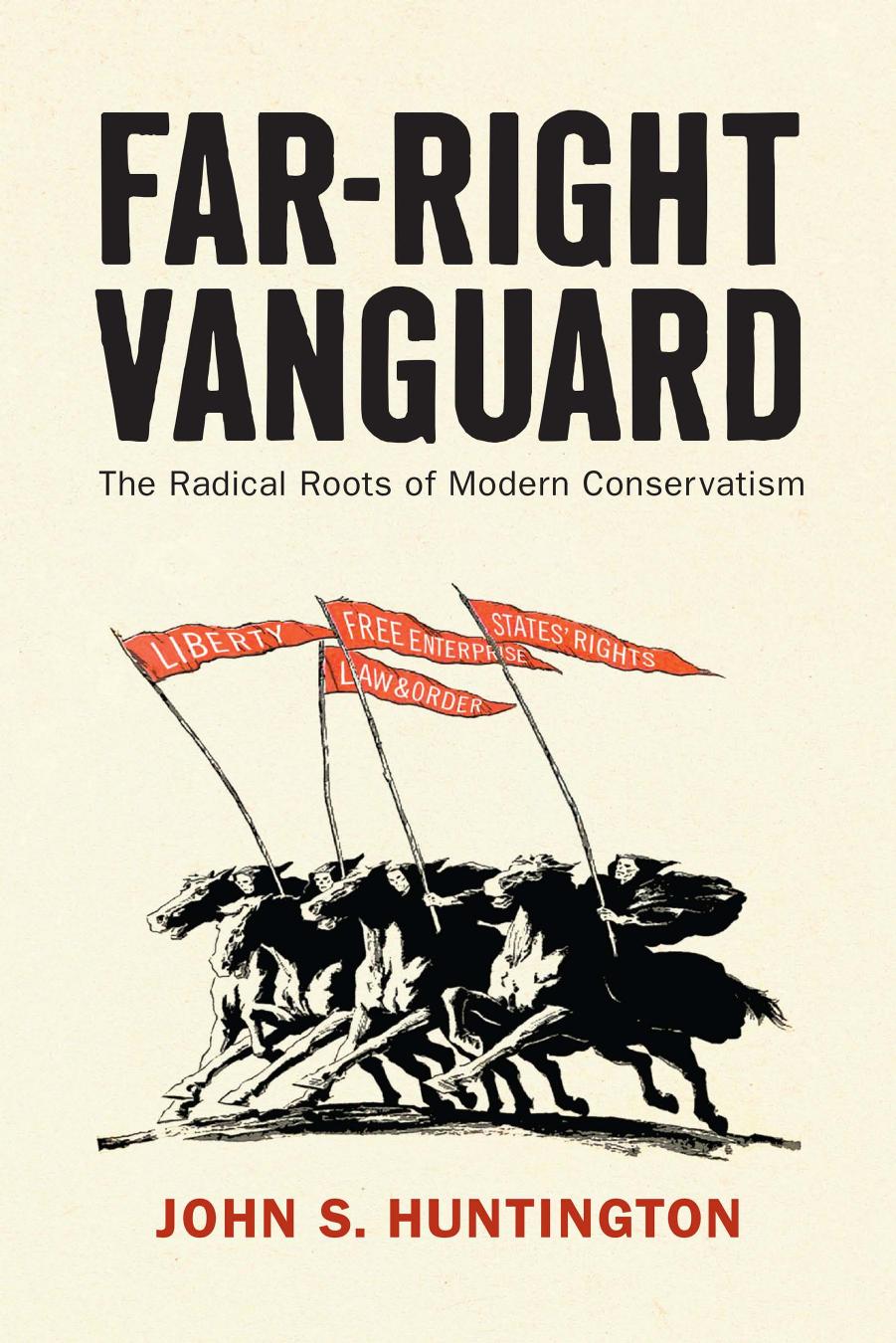Far-Right Vanguard by Huntington John S.;

Author:Huntington, John S.;
Language: eng
Format: epub, pdf
Publisher: University of Pennsylvania Press
Published: 2021-10-15T00:00:00+00:00
The Republican Partyâs ideological schism prohibited a unified front for Goldwater. Major GOP figures such as Rockefeller and Romney refused to endorse Goldwater, though Nixon campaigned on Goldwaterâs behalf. Incumbent president Lyndon Johnson portrayed Goldwater as a foreign policy extremist during a time when global events, such as Chinaâs first nuclear test, seemed to call for restraint rather than hawkishness. To make matters worse, Goldwaterâs connection to ultraconservative activists alienated many votersâan October poll showed a scant 16 percent approval rating, compared to 49 percent disapproval, for the Birch Society. Even though Goldwater tried to tamp down his far-right supporters, the stench of radicalism emanated from his campaign.170
On Election Day, November 3, 1964, Johnson overpowered Goldwater. âLandslideâ Lyndon won the popular vote by a margin of around sixteen million votes, netting a 61 percent to 39 percent victory. The electoral college returns were even more devastating. Goldwater garnered a scant 52 electoral votes compared to Johnsonâs titanic 486. It was the biggest electoral avalanche since Franklin Roosevelt trounced Alfred Landon in 1936. Johnsonâs victory was a microcosm of Democratic gains across the nation. Republicans lost seats in the Senate and House and within state legislatures, though the GOP did gain a handful of governorships. âThe decimation of the Republican Party in Congress will make life on Capitol Hill much easier for Lyndon B. Johnson,â wrote journalist Philip W. McKinsey.171 As groups such as Americans for Democratic Action moved to push Johnson further to the left, liberalism, it seemed, remained hegemonic.172
The election of 1964 prompted a flurry of autopsies on the state of conservatism. Many commentators announced that conservatism, as a viable political ideology, had breathed its last. Historian Richard Hofstadter argued that the Goldwater movement stemmed from âthe animosities and passions of a small minority,â a symptom of a âparanoid styleâ of American politics.173 James Reston of the New York Times wrote, âBarry Goldwater not only lost the Presidential election yesterday but the conservative cause as well.â174 âOf all the lessons the election returns taught,â suggested journalist Robert J. Donovan, âthe clearest is that the Republican Party, if it is ever to win again, must nominate a candidate who can attract the votes of Democrats and independents as well as Republicans.â175 According to the postmortems, not only had conservatism been crushed, voters had exiled it to the political periphery. Goldwater blamed Johnsonâs âruthlessâ behavior, an apathetic citizenry, GOP backstabbing, and a biased liberal media for his overwhelming defeat.176 After the shock had worn off, the Republican Party took steps to empower moderates and unmoor itself from Goldwater. Roscoe Drummond of the Los Angeles Times put it bluntly, âThus ends the Republican Partyâs experiment with extreme conservatism.â177
However, Goldwaterâs campaign was a crucial moment for the ascent of modern conservatism, despite contemporary obituaries that relegated right-wing thought to the historical dustbin. Goldwater won his home state of Arizona, but he also notched victories in Louisiana, Mississippi, Alabama, Georgia, and South Carolina. As Brady predicted, the South shocked the country. It was the
Download
This site does not store any files on its server. We only index and link to content provided by other sites. Please contact the content providers to delete copyright contents if any and email us, we'll remove relevant links or contents immediately.
| Africa | Americas |
| Arctic & Antarctica | Asia |
| Australia & Oceania | Europe |
| Middle East | Russia |
| United States | World |
| Ancient Civilizations | Military |
| Historical Study & Educational Resources |
The Bomber Mafia by Malcolm Gladwell(1184)
Submerged Prehistory by Benjamin Jonathan; & Clive Bonsall & Catriona Pickard & Anders Fischer(1162)
Facing the Mountain by Daniel James Brown(1136)
The Dawn of Everything by David Graeber & David Wengrow(1112)
The Way of Fire and Ice: The Living Tradition of Norse Paganism by Ryan Smith(1033)
Wandering in Strange Lands by Morgan Jerkins(1019)
Tip Top by Bill James(1004)
Driving While Brown: Sheriff Joe Arpaio Versus the Latino Resistance by Terry Greene Sterling & Jude Joffe-Block(1003)
Evil Geniuses: The Unmaking of America: A Recent History by Kurt Andersen(1001)
Red Roulette : An Insider's Story of Wealth, Power, Corruption, and Vengeance in Today's China (9781982156176) by Shum Desmond(1000)
F*cking History by The Captain(969)
It Was All a Lie by Stuart Stevens;(943)
White House Inc. by Dan Alexander(908)
Evil Geniuses by Kurt Andersen(903)
Treasure Islands: Tax Havens and the Men who Stole the World by Nicholas Shaxson(881)
American Dreams by Unknown(860)
American Kompromat by Craig Unger(850)
The Fifteen Biggest Lies about the Economy: And Everything Else the Right Doesn't Want You to Know about Taxes, Jobs, and Corporate America by Joshua Holland(817)
The First Conspiracy by Brad Meltzer & Josh Mensch(813)
